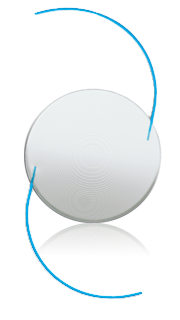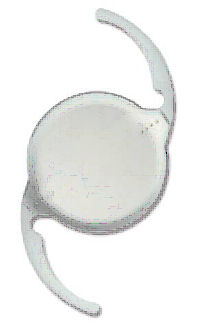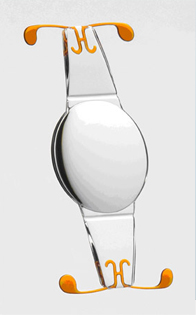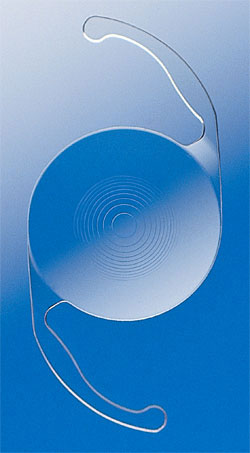Advanced Lifestyle Implant Lenses: Bifocal Implants and Astigmatism Correcting Implant Lenses
Advances here at Stahl Vision and Eye Laser and Surgery Center allow us to help you regain your near vision like when you were younger!
Advanced Lifestyle Implants are a premium implant lenses capable of restoring near vision and are used with cataract surgery or refractive lens exchange. These advanced lenses help correct the condition known as Presbyopia, an aging condition where we lose the ability to see up close. Unlike the standard Monofocal Implant Lenses, these advanced technology lenses provide excellent vision at the more than one distances-far or distance vision, and near vision. Depending on your specific vision requirements, there are different types of bifocal implants that Drs. Stahl & Knowles may select. These include the AcrySof® ReSTOR® Intraocular Lens Implant (IOL), the Tecnis® Multifocal Intraocular Lens Implant (IOL) and Crystalens® Accommodating Intraocular Lens Implant (IOL). Each of these Implants lenses or Intra-Ocular Lenses (IOL) works in a different way to help you achieve your vision correction goals of being able to see at a variety of distances after Cataract Surgery--without being dependent on eyeglasses, bifocals, readers or reading glasses. Drs. Stahl & Knowles will be able to suggest which one will help you achieve your vision correction goals after your surgery. For the vast majority of patients, choosing an advanced lifestyle bifocal implant lens means that you will be able to see at distance and up close without being dependent on eyeglasses, readers, bifocals or reading glasses.
For patients that have a lot of astigmatism, we now have astigmatism correcting implants as well—these are known as Toric Implant Lenses. You would not dream of having your glasses or contacts made without correcting astigmatism, because you could not see well without the astigmatism being corrected. Well good news, now your astigmatism can be corrected with your implant lens. This means clearer sharper vision without your glasses or contacts.
About the Symfony Lens and Tecnis® Multifocal Implant
 The Symfony (pronounced "symphony") and Tecnis® Multifocal Implant Lenses work by splitting the light reaching the eye into separate focal points, providing good vision at near and far. The Symfony Lens is an extended depth of focus lens, the newest and first of its class. The Symfony has good distance vision, very good intermediate vision, and fair near vision. The Symfony lens is also the first multifocal implant approved by the FDA to correct for astigmatism. It has been determined that patients who choose the Symfony lens experience the least amount of night glare, halos and starbursts over all other bifocal and trifocal lens options. The Tecnis Multifocal uses diffractive optics spread over the entire lens surface, and works well in dim and bright light conditions. The Tecnis Multifocal is better at near vision, but not quite as good at intermediate as a Symfony lens. Along with the ReSTOR lens, these lenses have some night glare and halos around lights. This night glare is very noticeable at first, but improves over time. In our hands, the newest generation Symfony lens has the least amount of night glare and the highest patient satisfaction of the lenses available. Strengths: distance and near. Weaknesses: Some glare/halos with night driving that improves over time.
The Symfony (pronounced "symphony") and Tecnis® Multifocal Implant Lenses work by splitting the light reaching the eye into separate focal points, providing good vision at near and far. The Symfony Lens is an extended depth of focus lens, the newest and first of its class. The Symfony has good distance vision, very good intermediate vision, and fair near vision. The Symfony lens is also the first multifocal implant approved by the FDA to correct for astigmatism. It has been determined that patients who choose the Symfony lens experience the least amount of night glare, halos and starbursts over all other bifocal and trifocal lens options. The Tecnis Multifocal uses diffractive optics spread over the entire lens surface, and works well in dim and bright light conditions. The Tecnis Multifocal is better at near vision, but not quite as good at intermediate as a Symfony lens. Along with the ReSTOR lens, these lenses have some night glare and halos around lights. This night glare is very noticeable at first, but improves over time. In our hands, the newest generation Symfony lens has the least amount of night glare and the highest patient satisfaction of the lenses available. Strengths: distance and near. Weaknesses: Some glare/halos with night driving that improves over time.
About the Toric Implant Lens
 Some patients have a lot of astigmatism, its something they have had their whole life. This astigmatism may have made it difficult to wear contact lenses, and difficult to correct fully with glasses. Astigmatism is where the shape of the eye is out of round, more shaped like the American football. Unless astigmatism is corrected, it makes it difficult to see at distance and near! Fortunately, now we can correct your astigmatism with a Toric Lens, or astigmatism correcting implant lens. The result is less dependence on glasses. Unless you choose a Toric Crystalens (called a Trulign Lens), you will still need reading glasses with a toric implant lens. You will however be able to wear the inexpensive “readers” that are readily available once your astigmatism is corrected. Strengths: sharper distance vision, can use inexpensive readers. Weaknesses: unless using a Toric Crystalens (Trulign), you will need readers for up close.
Some patients have a lot of astigmatism, its something they have had their whole life. This astigmatism may have made it difficult to wear contact lenses, and difficult to correct fully with glasses. Astigmatism is where the shape of the eye is out of round, more shaped like the American football. Unless astigmatism is corrected, it makes it difficult to see at distance and near! Fortunately, now we can correct your astigmatism with a Toric Lens, or astigmatism correcting implant lens. The result is less dependence on glasses. Unless you choose a Toric Crystalens (called a Trulign Lens), you will still need reading glasses with a toric implant lens. You will however be able to wear the inexpensive “readers” that are readily available once your astigmatism is corrected. Strengths: sharper distance vision, can use inexpensive readers. Weaknesses: unless using a Toric Crystalens (Trulign), you will need readers for up close.
About the Crystalens® Lens Implant
 The Crystalens® moves and flexes within the eye allowing it to change power or accommodate. This lens allows clear vision at distance and intermediate, but reading smaller print closer than 17 inches, may still require reading glasses. The Crystalens works differently than other implants like the Multifocal Tecnis or the ReSTOR and has the advantage of less night glare, and sharper contrast. The Crystalens can also correct for astigmatism, and this is a strong advantage for patients who want better near vision and whom also have astigmatism. The Crystalens that fixes astigmatism is a Toric lens, and is called a Trulign Lens. Strengths: distance, intermediate, & night driving. Weaknesses: may need readers for fine print or very close.
The Crystalens® moves and flexes within the eye allowing it to change power or accommodate. This lens allows clear vision at distance and intermediate, but reading smaller print closer than 17 inches, may still require reading glasses. The Crystalens works differently than other implants like the Multifocal Tecnis or the ReSTOR and has the advantage of less night glare, and sharper contrast. The Crystalens can also correct for astigmatism, and this is a strong advantage for patients who want better near vision and whom also have astigmatism. The Crystalens that fixes astigmatism is a Toric lens, and is called a Trulign Lens. Strengths: distance, intermediate, & night driving. Weaknesses: may need readers for fine print or very close.
About the Acrysof ReSTOR® Implant Lens
 Like Symfony Lens, and Tecnis® Multifocal Lens, the Acrysof IQ ReSTOR lens works by splitting the light reaching the eye into two focal points, providing good vision at near and far. The ReSTOR lens uses diffractive optics concentrated over the center of the lens surface, and works best in brighter light conditions. While the optical qualities of these lenses allows patients to see distance and near, some intermediate distances may be a little out of focus. In our experience, this lens has a little more night glare and halos around lights than the Multifocal Tecnis lens and Symfony lens. This night glare is very noticeable at first, but improves over time. ReSTOR lenses (ReStor IQ, come in several strengths, and now are able to correct for astigmatism. This allows your doctor to customize your vision to the distance where you are most comfortable reading. Strengths: distance and near. Weaknesses: Some glare/halos with night driving that improves over time, slightly less clear intermediate, near vision not as good in dim light conditions.
Like Symfony Lens, and Tecnis® Multifocal Lens, the Acrysof IQ ReSTOR lens works by splitting the light reaching the eye into two focal points, providing good vision at near and far. The ReSTOR lens uses diffractive optics concentrated over the center of the lens surface, and works best in brighter light conditions. While the optical qualities of these lenses allows patients to see distance and near, some intermediate distances may be a little out of focus. In our experience, this lens has a little more night glare and halos around lights than the Multifocal Tecnis lens and Symfony lens. This night glare is very noticeable at first, but improves over time. ReSTOR lenses (ReStor IQ, come in several strengths, and now are able to correct for astigmatism. This allows your doctor to customize your vision to the distance where you are most comfortable reading. Strengths: distance and near. Weaknesses: Some glare/halos with night driving that improves over time, slightly less clear intermediate, near vision not as good in dim light conditions.
If you decide to have an Advance Lifestyle bifocal implant lens or Toric Intra-Ocular Lens (IOL), our staff will review your questions and fully explain any additional fees related to the lens implant that you might be responsible for. Most insurances including Medicare cover the cost of the cataract surgery, the surgical facility fee for cataract surgery, and anesthesia fees, but not the cost of Advance Lifestyle bifocal implant lens or Toric Implant Lens. In most cases, Medicare or the insurance provider ask us to bill you for the additional cost of the necessary testing, the lens implant itself and its implantation. If you are having Refractive Lens Exchange, all of these fees are included in one global fee. Our staff will be pleased to review any costs and discuss special financing options with approved credit, should you decide that an Advance Lifestyle Bifocal Implant Lens or Toric Implant Lens is the best choice for you.
Our best eye surgeons Dr. Brian Stahl and Dr. James Knowles specialize in Laser eye surgery: LASIK plus PRK, Refractive Lens Exchange, and Cataract Surgery. Our Dayton, Ohio eye center puts Stahl Vision Center, Laser Vision Correction of Dayton, and Eye Laser and Cataract Surgery Center all under one roof conveniently located for patients from Sidney Ohio, Springfield Ohio, Urbana Ohio, Dayton Ohio, Cincinnati Ohio, West Chester Ohio, Eaton Ohio, Xenia Ohio, Jamestown Ohio, Franklin Ohio, Springboro Ohio, Waynesville Ohio, Lebanon Ohio, Mason Ohio, Oxford Ohio, and Middletown Ohio.
Please call Stahl Vision at 937.643.2020 to schedule an appointment to learn more about Cataracts and Refractive Lens Exchange with Advanced Lifestyle Bifocal Implant Lenses or for a complete eye examination.